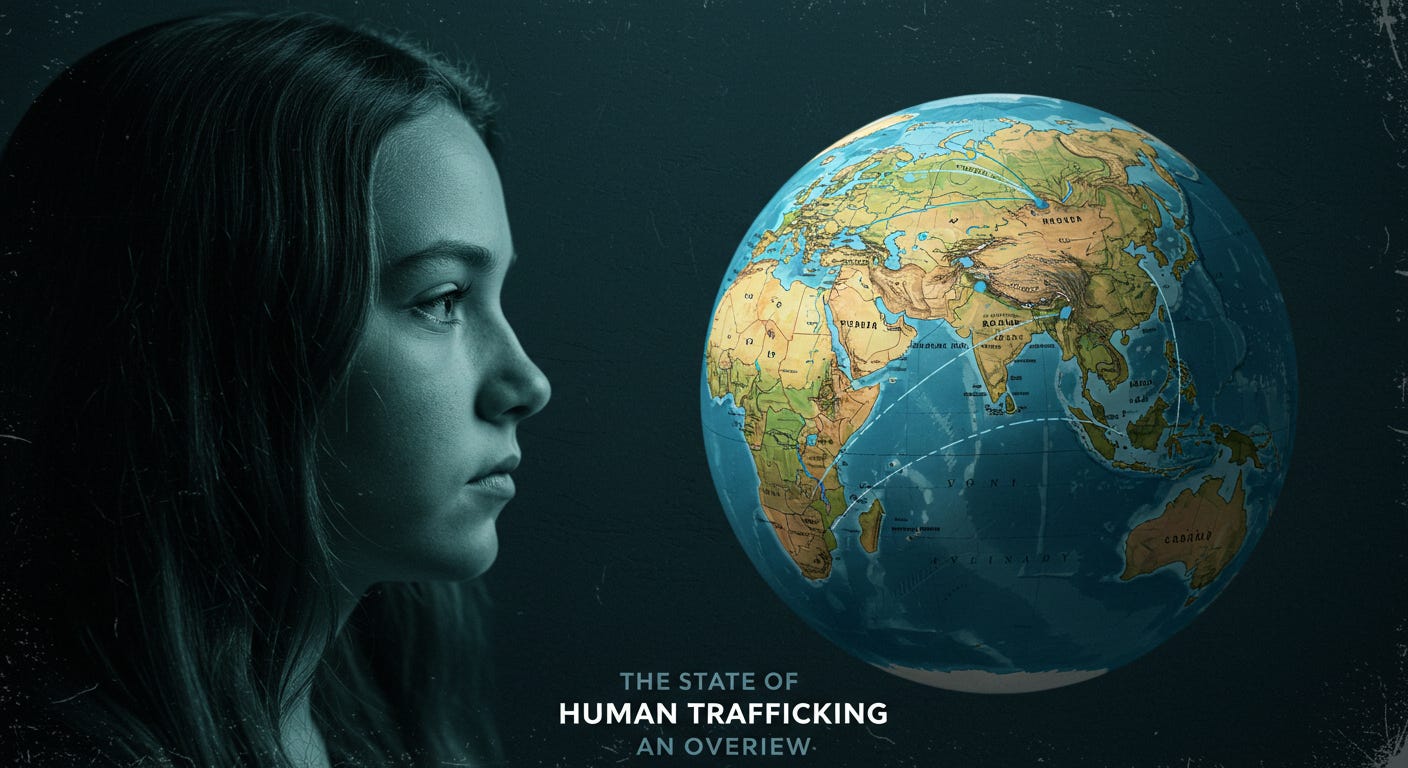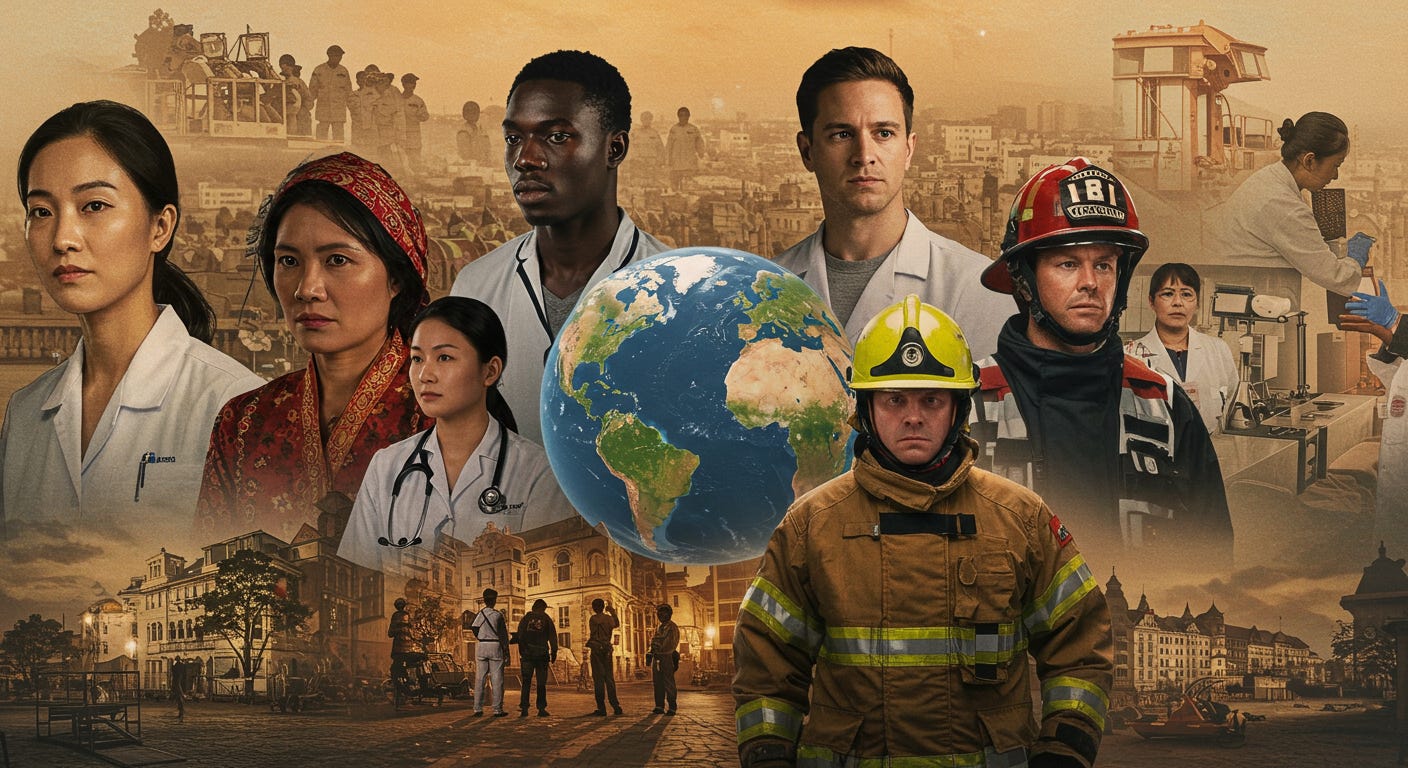State of Human Trafficking: An Overview
"In 22 years, the case I have today is just as difficult as the case I had the first day 22 years ago."
Dear Friends,
In this issue of Traffic Report, we examine the current state of human trafficking from two distinct but complementary viewpoints. Our editor Larry provides a comprehensive overview of legislative progress, technological challenges, and global response efforts in "The State of Human Trafficking: A 2024 Overview."
Meanwhile, Dottie offers her unfiltered perspective from 22 years on the frontlines of this battle. Speaking candidly from her greenhouse, Dottie acknowledges that while Larry "wrote a wonderful article," her own view is admittedly "myopic" - focused on the harsh realities she encounters daily in rescue and prevention work.
As Dottie puts it, "In 22 years, the case I have today is just as difficult as the case I had the first day 22 years ago." Her video provides a sobering counterpoint to discussions of progress, emphasizing the persistent dangers children face online and the gaps that remain in our response to trafficking.
Together, these pieces offer both the broader landscape of anti-trafficking efforts, and the ground-level reality of what families and survivors still face. Read Larry's analysis below, then watch Dottie's video for her frank assessment of where we stand in protecting our most vulnerable.
Much Love,
Dottie & Larry
The State of Human Trafficking: An Overview
A Complex Battle: Progress and Persistent Challenges
As we examine the current state of human trafficking, a complex picture emerges of both progress and persistent challenges in the fight against this global crisis. Recent legislative victories have strengthened our response, while evolving criminal tactics and emerging vulnerabilities demand continued vigilance and adaptation.
Legislative Victory Marks New Chapter
The passage of the Frederick Douglass Trafficking Victims Prevention and Protection Reauthorization Act of 2023 marks a significant milestone in federal anti-trafficking efforts. This comprehensive legislation commits $1.1 billion through 2027 to combat trafficking, representing a renewed national commitment to addressing this crisis. The Act strengthens prevention education, enhances survivor protections, and expands critical support services. At the state level, legislators have responded with their own measures, creating a more robust framework of protection and accountability across the country.
Digital Shadows: Technology's Double Edge
However, trafficking networks continue to adapt and evolve, particularly in their use of technology. Social media and messaging apps have become primary recruitment tools; while trafficking operations increasingly exploit online platforms to avoid detection. The rise of cryptocurrency transactions has added another layer of complexity to financial investigations, making it harder to track and disrupt trafficking operations.
Hidden in Plain Sight: The Labor Trafficking Crisis
Labor trafficking remains a persistent challenge, its tendrils reaching deep into global supply chains. Economic pressures have increased vulnerability to exploitation, particularly in domestic work and specific industries where oversight can be limited. The intersection of labor trafficking with legitimate business operations makes detection and enforcement particularly challenging.
Predators in the Digital Age
Meanwhile, sex trafficking operations have demonstrated alarming adaptability. Traffickers increasingly target minors through online gaming and social media platforms, while the growing intersection between sex trafficking and drug trafficking networks creates additional challenges for law enforcement. These operations have become more sophisticated, requiring equally sophisticated response strategies.
Law Enforcement Evolution: New Tools, New Approaches
Law enforcement agencies have responded by enhancing their digital investigation capabilities and strengthening international cooperation. There's a growing emphasis on trauma-informed interview techniques and financial investigations, recognizing that following the money often provides the most effective path to dismantling trafficking operations. The shift toward survivor-centered approaches represents a crucial evolution in how cases are handled and investigated.
Prevention: Beyond Awareness
Prevention efforts have expanded beyond traditional awareness campaigns to include more comprehensive approaches. Organizations are developing early warning systems and strengthening identification protocols, while cross-sector collaboration has improved the coordination of anti-trafficking initiatives. Survivor support services have evolved to provide more comprehensive care, including enhanced mental health services and economic empowerment programs.
Corporate Responsibility: Business Takes a Stand
The business sector has also shown increased engagement in anti-trafficking efforts. Companies face stricter supply chain transparency requirements and growing pressure from investors to implement robust anti-trafficking measures. This corporate accountability represents a crucial front in the broader fight against trafficking.
Global Response to a Global Crisis
International cooperation continues to strengthen, with enhanced information sharing and improved cross-border investigation protocols. However, global challenges such as conflict, environmental displacement, and economic instability continue to create conditions that traffickers exploit.
The Road Ahead: Priorities and Challenges
Looking forward, several priority areas demand attention. Prevention through education remains crucial, as does the continued development of technological investigation capabilities. Expanding survivor support services and improving cross-sector collaboration will be essential to making further progress. Perhaps most importantly, addressing the root causes of vulnerability to trafficking requires sustained commitment and resources.
Taking Action: Resources for Help and Reporting
For those seeking assistance or wishing to report suspected trafficking, the National Human Trafficking Hotline remains available 24/7 at 1-888-373-7888, by texting 233733 (BeFree), or online at humantraffickinghotline.org.
Unwavering Commitment: The Fight Continues
The fight against human trafficking requires sustained commitment, continued adaptation, and unwavering determination. While progress has been made, the evolving nature of trafficking operations demands constant vigilance and innovation in our response. Success in this fight depends on the continued collaboration of law enforcement, legislators, advocacy organizations, businesses, and communities working together toward a world free from trafficking.








